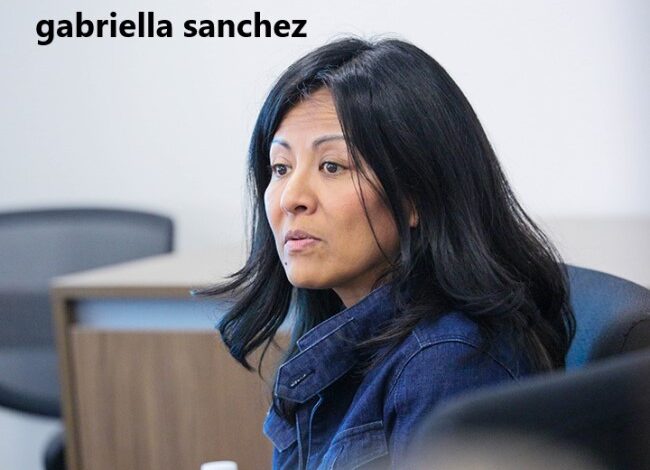Gabriella Sanchez: A Voice for Migration, Border Studies, and Ethical Research

Gabriella Sanchez is an accomplished scholar and researcher whose work has become essential in understanding migration, border control, and the social dynamics of human smuggling. With years of ethnographic research conducted across the Americas, North Africa, and Europe, she has developed a reputation as one of the leading voices in migration studies. Her academic journey and commitment to ethical research with vulnerable populations, particularly children and youth, make her a distinctive figure in global research and advocacy.
This article explores her life, career, research, and contributions to migration studies and criminology.
Early Life and Academic Background
Educational Journey
Gabriella Sanchez earned her Ph.D. in sociocultural anthropology from Arizona State University. During her studies, she developed a strong interest in migration-related crimes, particularly human smuggling and trafficking, which later became the foundation of her career.
Initial Research Interests
Her research started with a focus on the U.S.–Mexico border, where she worked closely with migrant communities. Unlike many who only studied migration from afar, Sanchez immersed herself in the field, documenting stories, conducting interviews, and observing the human challenges of border crossings.
Professional Career and Academic Roles
Teaching and Research Positions
Gabriella Sanchez has held prestigious positions in several universities worldwide. She served as an Assistant Professor of Security Studies and Associate Director for Research at the University of Texas at El Paso’s National Security Studies Institute. She has also been affiliated with institutions such as The Catholic University of America, Monash University’s Border Crossing Observatory, Wellesley College, and the University of Maryland’s Consortium for the Study of Terrorism.
Fellowships and Collaborations
She has been a research-associated fellow and later a collaborative fellow with Georgetown University’s Collaborative on Global Children’s Issues. In this role, Sanchez worked on creating training programs that emphasize ethical research and participatory approaches when engaging with vulnerable children and youth.
Her work at Georgetown focused on developing models that help professionals and students avoid reinforcing inequality or discrimination while conducting fieldwork.
Contributions to Migration Studies
Research on Smuggling and Trafficking
Gabriella Sanchez is best known for her research on migrant smuggling. She approaches the topic not as a distant crime but as a human-centered social activity. Her ethnographic studies have shown that smuggling often emerges from communities themselves, challenging the stereotype of smuggling networks as strictly organized criminal groups.
Book: Human Smuggling and Border Crossings
In 2015, she published Human Smuggling and Border Crossings, which became one of the most significant works in the field. The book is based on her fieldwork among facilitators of human smuggling at the U.S.–Mexico border. It was a finalist for the International Association for the Study of Organized Crime’s Book of the Year Award.
Her analysis reshaped how policymakers, academics, and the public view smuggling, emphasizing the human and community dynamics behind these activities.
Editorial Work
In 2018, she co-edited a special issue on migrant smuggling for The Annals of the American Academy of Political and Social Sciences. This publication provided new perspectives on smuggling and migration, highlighting the social, cultural, and economic contexts of these practices.
Ethical Engagement with Children and Youth
Focus on Vulnerable Populations
One of the most significant aspects of Gabriella Sanchez’s work is her dedication to ethical engagement with children and young migrants. She has emphasized that research involving children must go beyond data collection, advocating for participatory and community-centered methods.
Training Models
At Georgetown University, Sanchez designed training models for students and researchers, equipping them with tools to interact respectfully and responsibly with children in migration and border-related contexts. This approach ensures that research does not unintentionally reinforce inequality or expose participants to harm.
Influence and Recognition
Affiliations and Global Impact
Gabriella Sanchez’s expertise has earned her recognition worldwide. She has been affiliated with the Global Initiative against Transnational Organized Crime and Oxford University’s Border Criminologies. Her work is frequently cited in academic circles and has influenced migration policy debates at international levels.
Media and Public Discussions
Sanchez has been invited to participate in numerous discussions, interviews, and podcasts. She has shared her insights on the realities of human smuggling and border dynamics, bringing complex academic research into public conversations.
Research Approach and Methodology
Ethnographic Focus
Sanchez’s methodology is rooted in ethnography. By immersing herself in migrant communities, she builds trust and collects stories that often go unheard in mainstream narratives.
Participatory Research
Her participatory methods ensure that communities are not merely subjects of research but active participants in shaping how their stories are told. This approach aligns with her broader vision of ethical research and social justice.
Challenges in Migration Research
Misconceptions About Smuggling
One of the challenges Sanchez consistently addresses is the misconception that human smuggling is solely driven by organized crime. Her research demonstrates that smuggling often operates within local community networks, where people help each other navigate migration barriers.
Border Enforcement Policies
She has also highlighted the unintended consequences of strict border enforcement, such as pushing migrants toward more dangerous routes and increasing their vulnerability to exploitation.
Legacy and Future Contributions
A Scholar with Purpose
Gabriella Sanchez’s career reflects a unique combination of academic excellence and social responsibility. Her commitment to ethical research and her focus on vulnerable communities set her apart in the field of migration studies.
Continuing Impact
With her ongoing collaborations and training initiatives, Sanchez continues to influence how migration research is conducted. Her work will likely inspire a new generation of scholars who prioritize ethics, community engagement, and social justice in their academic pursuits.
Conclusion
Gabriella Sanchez is more than just a migration scholar—she is a voice for those who are often unheard in border studies. Her groundbreaking research on human smuggling, her book Human Smuggling and Border Crossings, and her dedication to ethical research with children and youth have made her a respected and influential figure.
By combining rigorous scholarship with compassion and ethical responsibility, Sanchez has left a lasting mark on migration studies. Her work continues to shape academic discussions, inform policy debates, and inspire future researchers worldwide.



